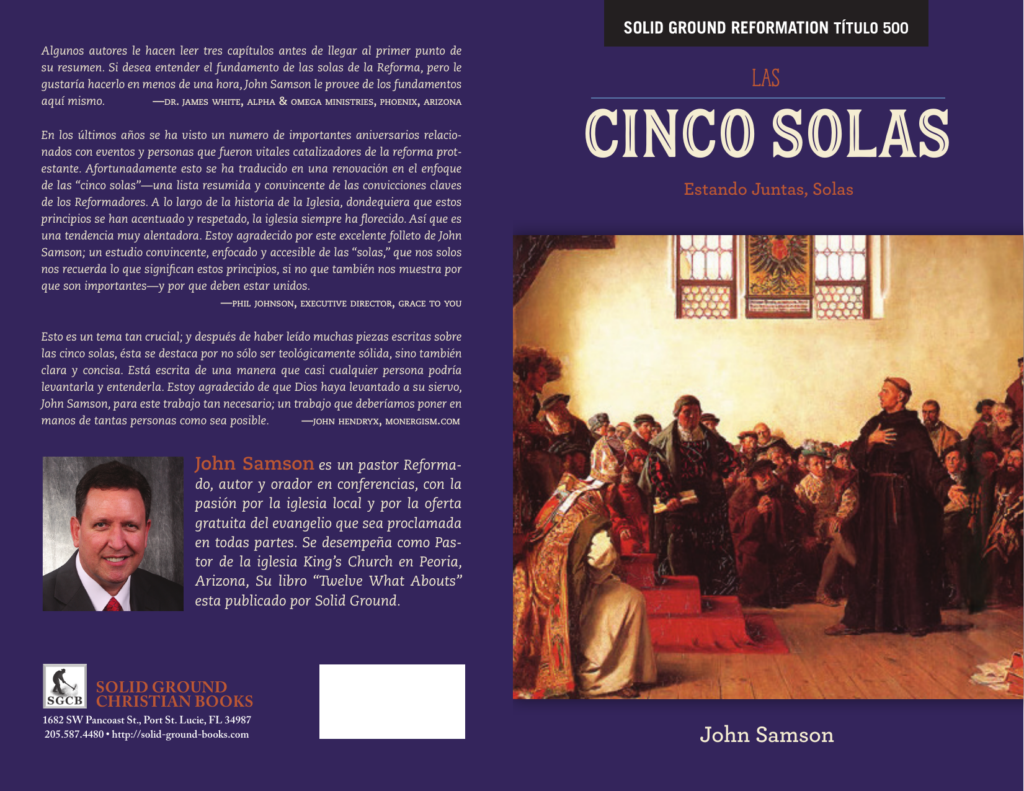Dr. James White
Session 1:
Session 2:
Session 3:

LAS CINCO SOLAS – ESTANDO JUNTAS, SOLAS

I am pleased to announce that as of this morning, the Spanish version of the Five Solas book is available for purchase. Here’s the link for both the English and Spanish versions of the Five Solas book (they are the second and third items on the list): http://www.solid-ground-books.com/books_SGCBBooklets.asp
“You have succinctly and clearly distilled the essence of the ‘solas.’ May God mightily use your book for His glory. Thank you for the encouragement in the gospel you have brought to me.” – R. C. Sproul
“This is such a crucial topic; and having read many pieces written on the five solas, this one stands out for not only being theologically sound, but also clear and concise. It is written in a way that just about anyone could pick up and understand. I am thankful that God has raised up his servant John Samson for this deeply needed work; a work we ought to get into the hands of as many people as possible.” – John Hendryx, monergism.com
“Get this book! Then get several more to share with your friends and family. John Samson has the remarkable ability to communicate essential truths with an undeniable passion and faithfulness that is winsome, clear, and devastating to the opposition. The people of God in this generation are in need of these old truths: the same truths that transformed the early church and led our heroes (throughout history) into living lives that changed the world. Go sell 100 of your vapid, modern Evangellyfish books and turn that money into getting this book into the hearts and minds of Christians everywhere.” – Jeff Durbin, Pastor, Apologia Church, Tempe, Arizona
“Recent years have seen a number of key anniversaries connected with events and people who were vital catalysts in the Protestant Reformation. Thankfully this has resulted in a renewed focus on the ‘five solas’–a convenient shorthand list of the Reformers’ key convictions. Throughout church history, wherever these principles have been stressed and adhered to, the church has always flourished. So it is a highly encouraging trend. I’m thankful for this excellent book by John Samson; a cogent, focused, and accessible study of the solas that not only reminds us what these principles mean, but also shows us why they are important–and why they must stand together.” – Phil Johnson, Executive Director, Grace to You
“Some authors make you read three chapters before getting to the first point in their outline. If you wish to understand the foundation of the solas of the Reformation but would like to do so in under an hour, John Samson provides you with the basics right here.” – Dr. James White, Alpha & Omega Ministries, Phoenix, Arizona
“Part celebration and part exposition, Pastor John Samson has provided a brief and readable introduction to the grand framing truths of the Reformation. In this timely little work, Samson particularly emphasizes how the five “Onlies” magnify God’s complete and gracious work of salvation in Jesus Christ — of which we learn in Scripture alone, which we find in Christ alone and enjoy by grace alone, through faith alone, to the glory of God alone! As a bonus, Samson not only concisely shows the radiance of each, but also the interrelationship of the whole. Pastors will find this a very useful introductory work for use in ministry.” – Dan Phillips, Pastor, Copperfield Bible Church, Houston, Texas
SPANISH VERSION NOW AVAILABLE http://www.solid-ground-books.com/detail_2257.asp
Please be in prayer as we seek to have the Five Solas book published in Spanish.
You can order your copy of The Five Solas in either eBook or audiobook formats at this link.